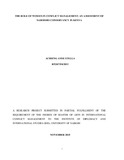| dc.description.abstract | This study contends that on one hand, cultural effects and the absence of appropriate policies in
Kenya and within conservancies which protect women‟s rights handicaps their participation in
decision making. However, on the other hand, the inclusion of women in decision making in
conflict management increases their efficiency. The government has undertaken several initiatives
towards enhancing conflict management and peace building in the country through the national
steering committee on peace building and conflict management. They have not only developed a
draft framework for a policy on conflict management but also formulated a draft national policy on
peace building and conflict management. However, the policy does not address issues of gender
especially in defining the roles of women in conflict management. This has raised the question as
to what extent women are involved in conflict management process in Kenya. This study has
attempted to look at how inclusion of women conflict management processes and decision making
in conflict related programmes could contribute to effective outcomes .Relying on descriptive
research design, the study adapts a case study approach by focusing its evaluation on
conservancies in Kenya with main focus on Naboisho conservancy in Maasai Mara. Purposive
sampling was used for key informants who had specific type of knowledge and skills required for
the study. It uses qualitative approach to derive data from primary and secondary sources. | en_US |

